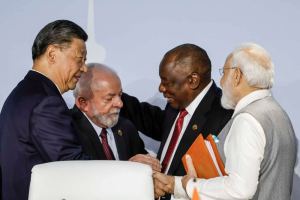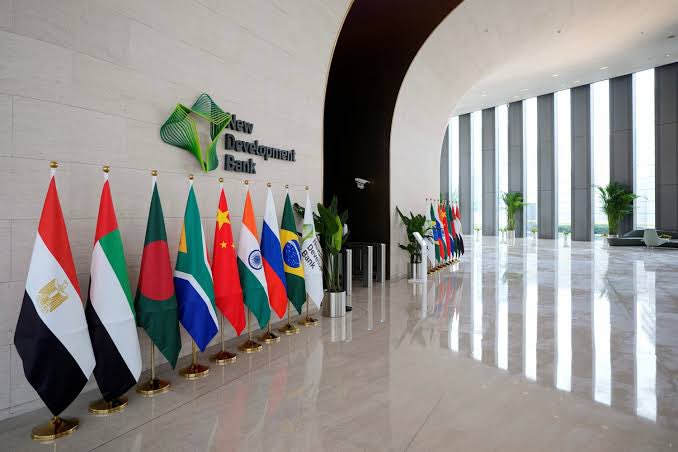BLOG | The Future is Here: A New World Order has been Set in Motion on Africa’s Soil [II]
Part 2: Africa’s Five Key Takeaways from BRICS
This is a sequel to Yavi Madurai’s fortnight blog, The Future is Here: A New World Order has been Set in Motion on Africa’s Soil under the subtitle: BRICS and the AfCFTA Effect.

It was two weeks ago that South Africa’s President Cyril Ramaphosa closed the BRICS Summit here in Johannesburg, South Africa. Interestingly, two weeks later, South Africa is attending the G20 Summit being hosted by its BRICS peer, India – and some of the top issues on the G20’s agenda might have been put into motion at the BRICS Summit.
Now, let’s take a deep dive into Africa’s main takeaways from the BRICS Summit;
- BRICS as prelude to Africa’s G20 membership
Ahead of the G20 Summit, Indian Prime Minister Narendra Modi had written to G20 leaders, proposing the African Union (AU) be granted full and permanent membership of the bloc at the Summit in New Delhi. Unconfirmed reports suggest it is highly likely the bloc will grant a permanent membership status to the AU, which would give the Union the same status as the European Union, currently the only regional bloc with a full membership in the G20, while the AU’s current designation is “invited international organization”.
- An advocacy platform for the UN Security Council reform
Reform of the United Nations Security Council was a major topic at the BRICS Summit, which was backed by firm calls for equal participation of emerging economies in the Security Council. The Summit Declaration was the first time the bloc targeted the longstanding UN Security Council membership issue.
“We support a comprehensive reform of the UN, including its Security Council, with a view to making it more democratic, representative, effective and efficient, and to increase the representation of developing countries in the Council’s memberships so that it can adequately respond to prevailing global challenges and support the legitimate aspirations of emerging and developing countries from Africa, Asia and Latin America, including Brazil, India and South Africa, to play a greater role in international affairs, in particular in the United Nations, including its Security Council,” the Declaration reads.
Today’s global governance structures reflect yesterday’s world, was the sentiment reechoed by UN Secretary-General António Guterres at the BRICS Summit. “They were largely created in the aftermath of World War II, when many African countries were still ruled by colonial powers and were not even at the table,” Guterres remarked at the closing session. “This was particularly true of the Security Council and the Bretton Woods institutions,” referring to the World Bank and International Monetary Fund as well.
- The green economy, food security and healthcare as key sectors for partnerships
We keep hearing, “Africa has enough arable land to feed the world,” yet Africa’s net import of food and agricultural products far outweighs the export of raw materials, let alone export-ready products.
Summit discussions centered around the use of technology to modernize and optimize the agricultural sector, which would not only result in improved food security but also reduce the cost of food for developing countries and poverty-stricken nations, with the boon of decarbonizing the planet and finally making Africa ‘the world’s bread basket’. Haven’t we been talking about this for years now?
Jai Shroff, the Global Chief Executive of UPL and India’s BRICS Business Council member, said if BRICS could take the lead in rewarding farmers for sustainable conduct, the world’s efforts to decarbonize would see a major shift. This would be especially true for Africa, where climate change and climate change-induced irregular migration impact small and rural farmers the most, mainly women.
The ‘green economy’ discussion narratives focused on transitions and making economies ‘greener’ by not just steering national development plans towards the creation of eco-friendly jobs to ensure transitions are low-carbon and sustainable, especially in sectors such as vehicle and technology manufacturing.
During the Summit, BRICS states, the Africa CDC, the WHO, Africa Health Business, and the South African chapter of the BRICS Business Council, co-hosted an interesting dialogue on how to collaboratively work on a potential AU-BRICS framework of cooperation for Pandemic Preparedness, Prevention, Response and Recovery (3P2R), that is actionable and implementable, drawing from the AU and BRICS collective experiences in dealing with Covid-19.
I have previously written about the Africa CDC’s DG Jean Kaseya’s determination to leave a legacy of local vaccine manufacturing in Africa for Africans. This was the key driver of the discussions at the dialogue and a response to the potential next pandemic arising from non-communicable diseases, according to Dr Kaseya.
- No BRICS currency just yet but de-dollarisation is definite
The New Development Bank, or ‘BRICS Bank, plans to use its founding members’ local currencies to facilitate trade, loans and investment, which by default means less reliance on the US dollar in trade and finance. To this end, one of the Summit’s outcomes was an agreement to task the BRICS Finance Ministers and Central Bank Governors, to explore modalities for a BRICS currency and report back to the BRICS leaders by the next summit.
However, South African Reserve Bank Governor Lesetja Kganyago told the media last week that at this point, a common BRICS currency is unlikely because it would require a common central bank, monetary policy, and fiscal union – which could only be possible in the future as the BRICS bloc expands.
- It ALL comes down to the African Continental Free Trade Area (AfCFTA)
Many delegates at the BRICS Summit opined they were leaving with a renewed optimism about BRICS’ future, even as there was a need for increased trade and investment among member states as well as the strengthening of the bonds among the BRICS ‘brotherhood.’
Sergey Katyrin, Chair of the Russian chapter of the BRICS Business Council, said he hopes that BRICS states will constitute 50% of the global GDP by 2050. That in itself would significantly reshape the global economy.
Most partnerships and investment discussions centered around the benefits of the AfCFTA, with the BRICS Summit being a new launchpad to open up new markets. However, political stability was a key concern among discussants, being a major prerequisite for fostering market certainty and predictability. So, as we drive the AfCFTA agenda, it is critical to note that investment, specifically FDI, is inextricably linked to political stability in any country.
Speakers from most panels discussed how to strengthen the BRICS bloc’s coordination and collaboration to support the current AfCFTA momentum on the continent, particularly because of the role a successful AfCFTA will play in transforming trade and, consequently, Africa’s FDI/investment landscape.
See you at the 16th BRICS Summit in October 2024 in Kazan, Russia
















